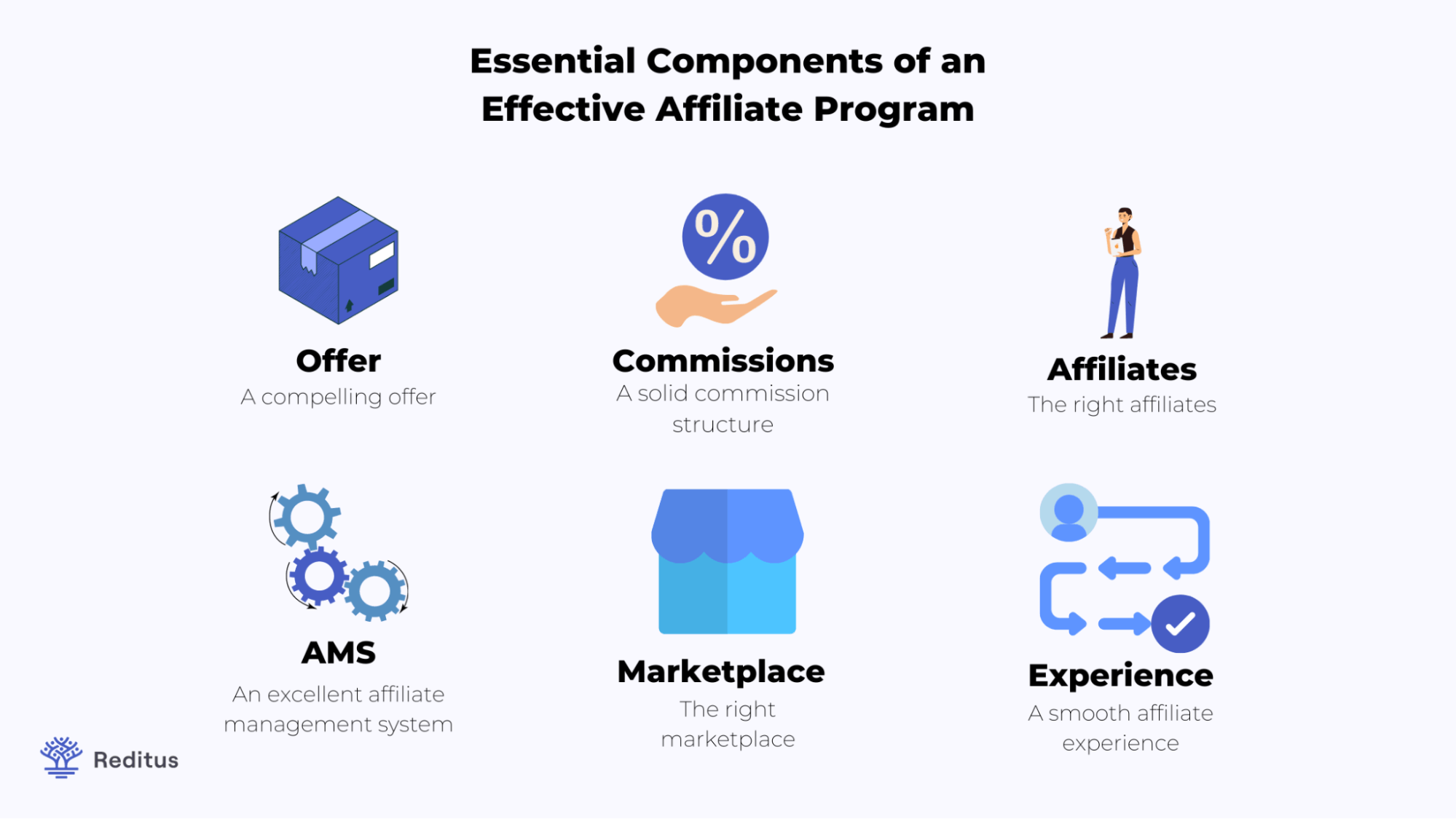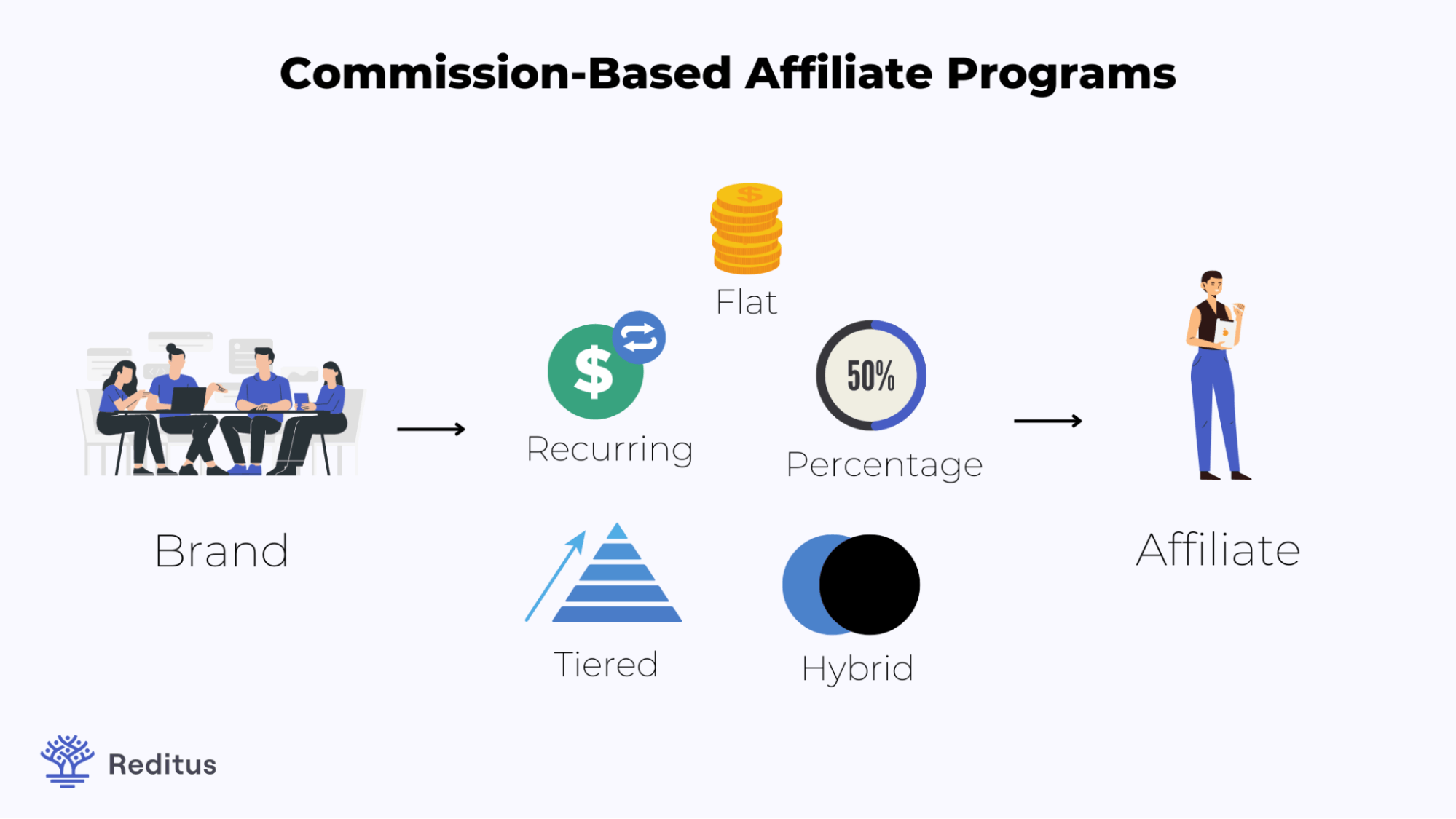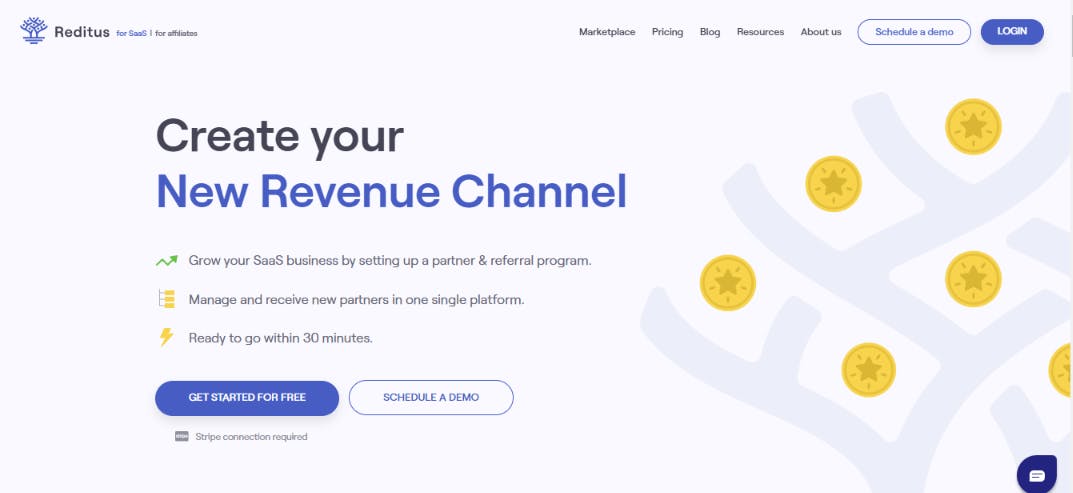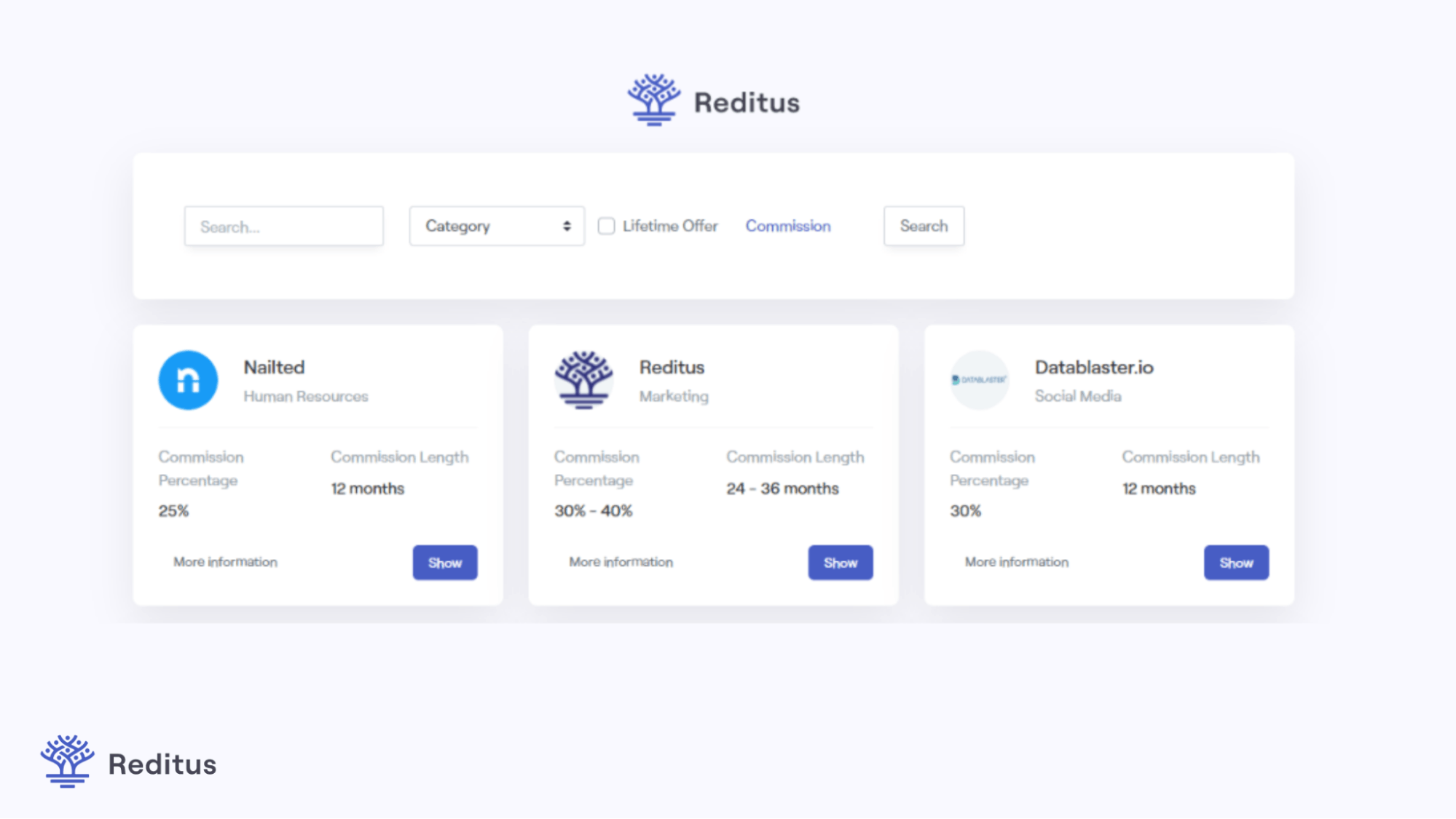The Anatomy of the Perfect SaaS Affiliate Program

Every great SaaS affiliate program is composed of a few key elements.
By understanding these and how they work together, you can create a program that benefits your company and provides value for your affiliates.
After all, a strong affiliate program is a two-way street. It's not just about attracting affiliates but also about maintaining high-quality relationships with those partners.
Today, we'll break down the anatomy of a perfect SaaS affiliate program and show you how to optimize yours for long-term success.
Table of contents
Why Should You Take a Formulaic Approach to Your SaaS Affiliate Program?
There's a reason why most successful affiliate programs have a similar structure. They've been proven to work.
Of course, that doesn't mean that your program has to be cookie cutter. You can (and should) put your own spin on things. But at the end of the day, you need to make sure that your program has all of the critical elements in place if you want it to succeed.
As the old saying goes, "Know the rules well, so you can break them effectively."
Instead of looking at this formulaic approach as restrictive, think of it as a foundation that you can build upon.
Once you have all of the essential elements in place, you can experiment with different strategies and tactics to find what works best for your company.
What Are the Essential Components of an Effective Affiliate Program?
No two affiliate programs are exactly alike. But there are certain elements that all successful programs share:
- A compelling offer
- A solid commission structure
- The right affiliates
- A smooth affiliate experience
- An excellent affiliate management system
- The right marketplace

Let's take a closer look at each of these elements.
1. A Compelling Offer
Effective affiliate marketing starts with a great product. Without proof of concept, your affiliates will have a hard time promoting your brand.
Make sure that you have a Saas product that solves a real problem for your target market. And be prepared to back up your claims with data and customer testimonials. Your affiliates will be much more successful (and enthusiastic) if they believe in your product.
For instance, if you're promoting a new app, show how it offers unique value compared to similar products. Highlight your competitive advantages and give your affiliates the resources to sell your product effectively.
Your affiliates will also want to know what percentage of users stick around after the free trial period or how much revenue your average customer generates. In short, they'll want to see that there's a real opportunity to make money by promoting your product.
The more compelling your offer, the easier it will be for your affiliates to sell it.
2. A Solid Commission Structure
Your commission structure dictates how much affiliates get paid for each sale they generate. It's one of the most essential elements of your affiliate program, significantly impacting your success.

There are three main types of commission structures:
- Percentage-based: Affiliates receive a certain percentage of the sale price for each customer they refer. For example, you might offer affiliates a 10% commission.
- Flat-rate: Affiliates receive a set amount of money for each customer they refer, regardless of the sale price. For example, you might offer affiliates a $50 bounty for each new customer they bring in.
- Tiered: Affiliates receive a higher commission for referring more customers. For example, you might offer affiliates a 10% commission for the first five customers they refer and a 15% commission for any customers beyond that.
Which commission structure is proper for you? That depends on your business model and your relationships with your affiliates.
Percentage-based commissions are the most common type of commission structure, and they're often the most effective.
That's because they give affiliates a greater incentive to generate sales. The higher the sale price, the more money they stand to make.
The average order value of your product will play a significant role in determining the right commission level for your program. A typical percentage-based commission is 10%. But it can range from as low as 1% to as high as 50%.
Also, you must consider whether your affiliates will earn recurring commissions.
If your product has a subscription-based pricing model, then you'll want to offer affiliates a percentage of each sale, as well as a percentage of any future renewals.
Of course, you must find a balance between what's fair to your affiliates and profitable for your business.
Some other things to consider might include:
- The average order value of your product
- How expensive it is to acquire a new customer
- What type of customers you're looking for (enterprise vs. small business, etc.)
- How long you're willing to pay commissions for (lifetime vs. one-time)
- The competitiveness of your industry
These are just a few factors that will influence your commission structure. Be sure to consider them carefully before making any decisions.
3. The Right Affiliates
Your affiliates will make or break your program. That's why it's so important to choose them carefully.
You'll want to look for affiliates who:
- Are well-connected in your target market
- Have a large audience or reach
- Are influential in their community
- Can generate a high volume of traffic
- Have a proven track record of success
Affiliates who meet these criteria are more likely to successfully promote your product. They also tend to have more sway with their audience, leading to more sales for you.
You should also consider the type of relationship you want with your affiliates. Do you want to work with them closely, or do you prefer to let them operate independently?
There's no right or wrong answer here. It all depends on your preferences and your business goals. Some affiliate programs are very hands-on, while others are more relaxed.
Just make sure to create an "affiliate persona" before you start recruiting affiliates. Define the type of affiliates you're looking for, and only approach those who fit the bill.
4. A Smooth Affiliate Experience
Your affiliate program should be easy to use and navigate.
That might seem like a no-brainer, but you'd be surprised how many affiliate programs are needlessly complex.
The last thing you want is for your affiliates to get frustrated and give up.
To avoid that, make sure your affiliate program is:
- Easy to join: The application process should be straightforward. You shouldn't require potential affiliates to jump through hoops to join your program.
- User-friendly: Your affiliate portal should be easy to navigate. All the tools and resources affiliates need should be easily accessible.
- Intuitive: Affiliates should be able to quickly figure out how to promote your product and earn commissions without contacting you for help.
Otherwise, you risk losing affiliates before they even get started.
5. An Excellent Affiliate Management System
Even though starting an affiliate program can be pretty straightforward, managing it is another story.
That's why you need an affiliate management system (AMS).
An AMS is a software platform that helps you manage your affiliate program. It gives you the tools to recruit affiliates, track their performance, and pay them commissions.
It also provides affiliates with their own portal to access their account information, promotional materials, and more.
There are many different AMS solutions on the market, so it's essential to choose one right for your business.
With Reditus, for example, you get a complete affiliate management system with everything you need to run a successful program.

Reditus includes:
- Tracking and reporting: Reditus lets you track all the critical metrics of your affiliate program in one place. This includes click-through rates, conversion rates, traffic sources, and more.
- Payment processing: Reditus makes it easy to pay your affiliates on time. It can automatically calculate commissions and send out payments.
- Partner management: Manage partner information in a central location. This includes contact information, account status, and performance metrics.
- Team training: Reditus provides training for your team to get the most out of the platform.
You can schedule a free Reditus demo today and see how it can help you run a successful affiliate program.
6. The Right Marketplace
An affiliate marketplace is a platform where affiliates can find products to promote.
If you want to recruit affiliates, you need to list your program in the right marketplace. Otherwise, you'll have a hard time finding affiliates interested in promoting your product.
There are many different affiliate marketplaces to choose from.
When you sign up for a Reditus account, you get the opportunity to list your program in our marketplace. This will help you reach a larger audience of potential affiliates.

Besides, our marketplace is curated. This means that only B2B SaaS programs are listed.
As a result, you can be sure that the affiliates who find your program are serious about promoting it.
So, How Can You Develop a Successful Affiliate Program?
Now that you understand the elements of an effective affiliate program, it's time to explore how to actually start one. (Or, if you're ready to get started, you can schedule a free Reditus demo today.)

